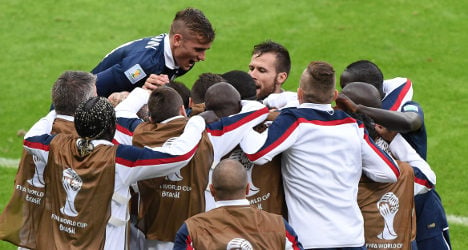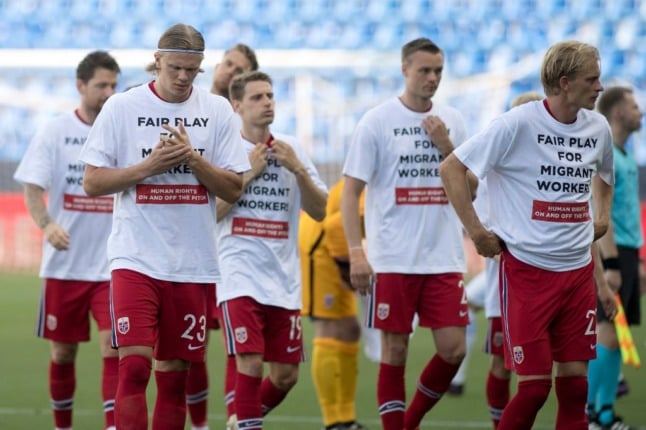WORLD CUP
History made as France beat Honduras 3-0
France were awarded the first goal using goal-line technology at a World Cup finals in controversial circumstances during their opening Group E game against Honduras on Sunday night. France won the bruising game 3-0.
Published: 15 June 2014 22:48 CEST

The French team celebrate after scoring against Honduras on Sunday night. Photo: Luis Acosta/AFP
France beat 10-man Honduras 3-0 in a bruising World Cup clash on Sunday where goal-line technology awarded the first international goal in history.
Three minutes into the second period, the German-manufactured GoalControl system was called into action when a volley from Karim Benzema, who ended the night with two goals, came back off the post.
The ball bounced back into the area before hitting Honduras goalkeeper Noel Valladares.
He then tried to scoop the ball to safety, but Brazilian referee Sandro Ricci awarded the goal – classed as an own-goal – after consulting the instant technology.
Benzema was the star man as he opened the scoring from the penalty spot after Wilson Palacios had been sent-off for two bookable offences on Paul Pogba.
Benzema then played a major role in his side's historic second goal and the Real Madrid striker rounded off a fine afternoon with an emphatic finish 18 minutes from time.
Victory moves Didier Deschamps' men above Switzerland on goal difference in Group E after the Swiss beat Ecuador 2-1 earlier in the day with the two European sides set to meet next on Friday in Salvador.
The game had begun in bizarre circumstances as neither sides' national anthem was sung before kick-off, but normality was restored once proceedings got underway as France dominated from the off.
Blaise Matuidi had the first clear chance on 15 minutes when Mathieu Valbuena's free-kick was only partially cleared and the Paris Saint-Germain midfielder's effort was brilliantly turned onto the bar by Valladares.
Antoine Griezmann was then also denied by the crossbar for Les Bleus as he rose highest to meet Patrice Evra's cross but his header clipped the woodwork on its way over.
Benzema saw another good opportunity fly over moments later as he headed off target after a fine counter-attack involving Matuidi, Griezmann and Valbuena.
Ricci had a big call to make midway through the half when Pogba clashed with Palacios.
The Juventus midfielder lashed out at Palacios after appearing to be stamped on, but Ricci showed only yellow cards to both.
Palacios was only to last another 16 minutes in any case as he stupidly bundled Pogba over inside the area a minute before half-time and was shown his second yellow card.
Benzema stepped up to convert the resulting spot-kick to register his seventh goal in as many games for France and his first in a World Cup.
The 26-year-old was heavily involved again as France doubled their advantage within three minutes of the second-half courtesy of the goal line technology.
However, there was still confusion as replays inside the stadium first showed Benzema's initial shot hadn't gone in before confirming the ball had indeed crossed the line via the hand of Valladares.
Benzema should have added to his tally moments later when he was picked out by a fine low cross from Griezmann but could only fire straight at Valladares.
However, he wasn't to be denied 18 minutes from time when he fired expertly high past Valladares from a narrow angle to seal the three points.
Url copied to clipboard!


 Please whitelist us to continue reading.
Please whitelist us to continue reading.
Member comments